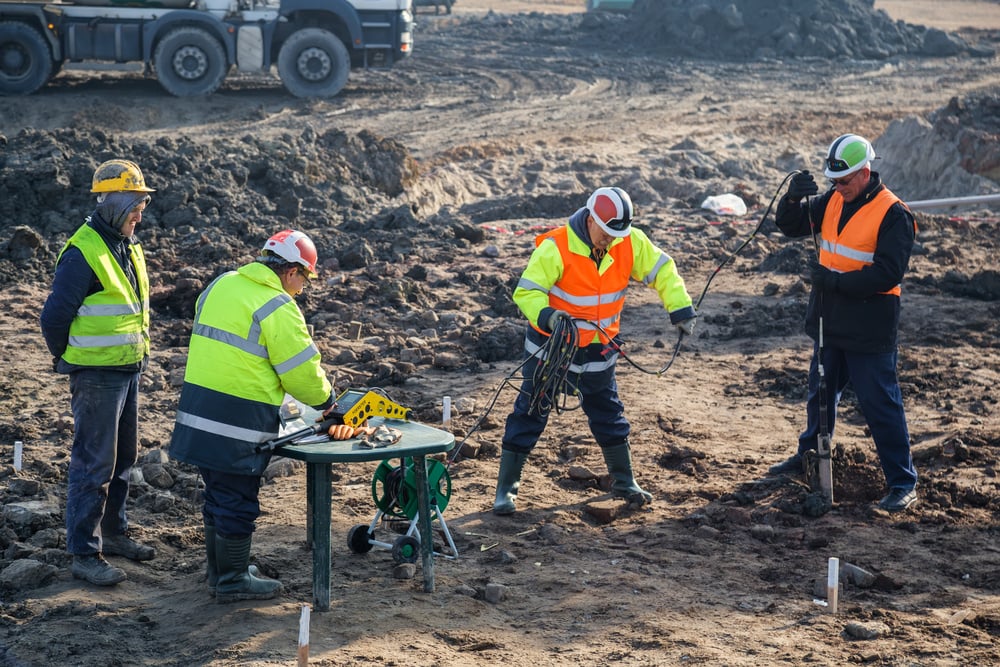What Does Geotechnical Engineering For Construction Projects Do?
The smart Trick of Geotechnical Engineering For Construction Projects That Nobody is Talking About
Table of ContentsThe Best Strategy To Use For Geotechnical Engineering For Construction ProjectsFascination About Geotechnical Engineering For Construction ProjectsGet This Report about Geotechnical Engineering For Construction ProjectsGetting The Geotechnical Engineering For Construction Projects To WorkThe Single Strategy To Use For Geotechnical Engineering For Construction ProjectsAll About Geotechnical Engineering For Construction Projects
These features need to be taken a look at by geotechnical designers to anticipate their movements under numerous conditions., making this analysis necessary., in enhancement to exactly how they connect with constructions that have actually been set up on or within them, is one of the key explanations for why geotechnical engineering is crucial.
In addition to architectural preparation and building, geotechnical design is also crucial to the repair and maintenance of pre-existing structures. Age-related deterioration or added issues might influence a structure's stability and performance. Environmental management is achieved via geotechnical engineering. Knowledge in air, water, and dirt quality maintenance is used by geotechnical designers to minimize the negative impacts of tasks.
Infrastructure advancement, offshore design, tunnel building and construction, and deep structures. Risk-based style and multidisciplinary teams. These components will maintain the area evolving and ensure its continued relevance in the years to come. To summarize, geotechnical design is a vital technique that protects the durability and stability of civil framework. Geotechnical designers add to making structure jobs effective all over the globe by comprehending the behavior of earth materials and applying appropriate preparation methods.
10 Easy Facts About Geotechnical Engineering For Construction Projects Described
The fundamental stability of any kind of project is essential. Geotechnical design plays a crucial function in guaranteeing that structures are improved solid ground, essentially and figuratively. By analyzing dirt, rock, and subsurface problems, geotechnical engineers supply essential insights that aid in the layout, construction, and maintenance of buildings and facilities.

The 3-Minute Rule for Geotechnical Engineering For Construction Projects
Research laboratory testing: Determining the homes of soil and rock. Several prominent construction tasks have effectively utilized geotechnical design to ensure their stability and safety.

As a leader in geotechnical engineering, BECC Inc. is committed to providing cutting-edge and efficient options that meet the greatest requirements of quality and security. For additional information on exactly how BECC Inc. can support your following building job, contact us today and allow us help you develop on solid ground.
William Rankine, a designer and physicist, developed an alternate to Coulomb's earth stress theory. Albert Atterberg established the clay consistency indices that are still made use of today for soil category. In 1885, Osborne Reynolds acknowledged that shearing reasons volumetric dilation of thick products and contraction of loose granular products. Modern geotechnical engineering is stated to have begun in 1925 with the magazine of Erdbaumechanik by Karl von Terzaghi, a mechanical designer and rock hound.
The 45-Second Trick For Geotechnical Engineering For Construction Projects
Terzaghi likewise created the structure for concepts of birthing capacity of foundations, and the theory for prediction of the price of settlement of clay layers due to consolidation. Afterwards, Maurice Biot fully developed the three-dimensional dirt consolidation concept, prolonging the one-dimensional design formerly created by Terzaghi to extra basic theories and presenting the collection of fundamental formulas of Poroelasticity.
Geotechnical designers examine and establish the properties of subsurface problems and materials.
Facts About Geotechnical Engineering For Construction Projects Uncovered
Geologic mapping and interpretation of geomorphology are commonly completed in consultation with a more information geologist or engineering geologist. Subsurface exploration generally involves in-situ testing (for instance, the common infiltration examination and cone infiltration examination). The excavating of examination pits and trenching (specifically for finding faults and slide planes) might additionally be utilized to find out about soil conditions at depth. Still, they are occasionally made use of to allow a geologist or designer to be decreased right into the borehole for straight visual and hands-on exam of the dirt and rock stratigraphy. Different dirt samplers exist to fulfill the requirements of different engineering jobs. The standard penetration examination, which uses a thick-walled split spoon sampler, is the most common linked here way to collect disrupted samples.

Typically, the user interface's exact geometry is unidentified, and a streamlined interface geometry is thought. Limited slopes call for three-dimensional designs to be assessed, so most slopes are analyzed presuming that they are definitely large and can be represented by two-dimensional designs.
9 Easy Facts About Geotechnical Engineering For Construction Projects Explained
The observational technique might be referred to as adheres to: General exploration sufficient to establish the rough nature, pattern, and properties of deposits. Assessment of one of the most probable conditions and the most negative conceivable discrepancies. Producing the design based on a functioning theory of habits expected under the most possible conditions. Choice of quantities to be observed as building profits and computing their anticipated values based on the working hypothesis under the most unfavorable problems.
Dimension of amounts and analysis of actual problems. It is improper for jobs whose design can not be modified throughout construction.